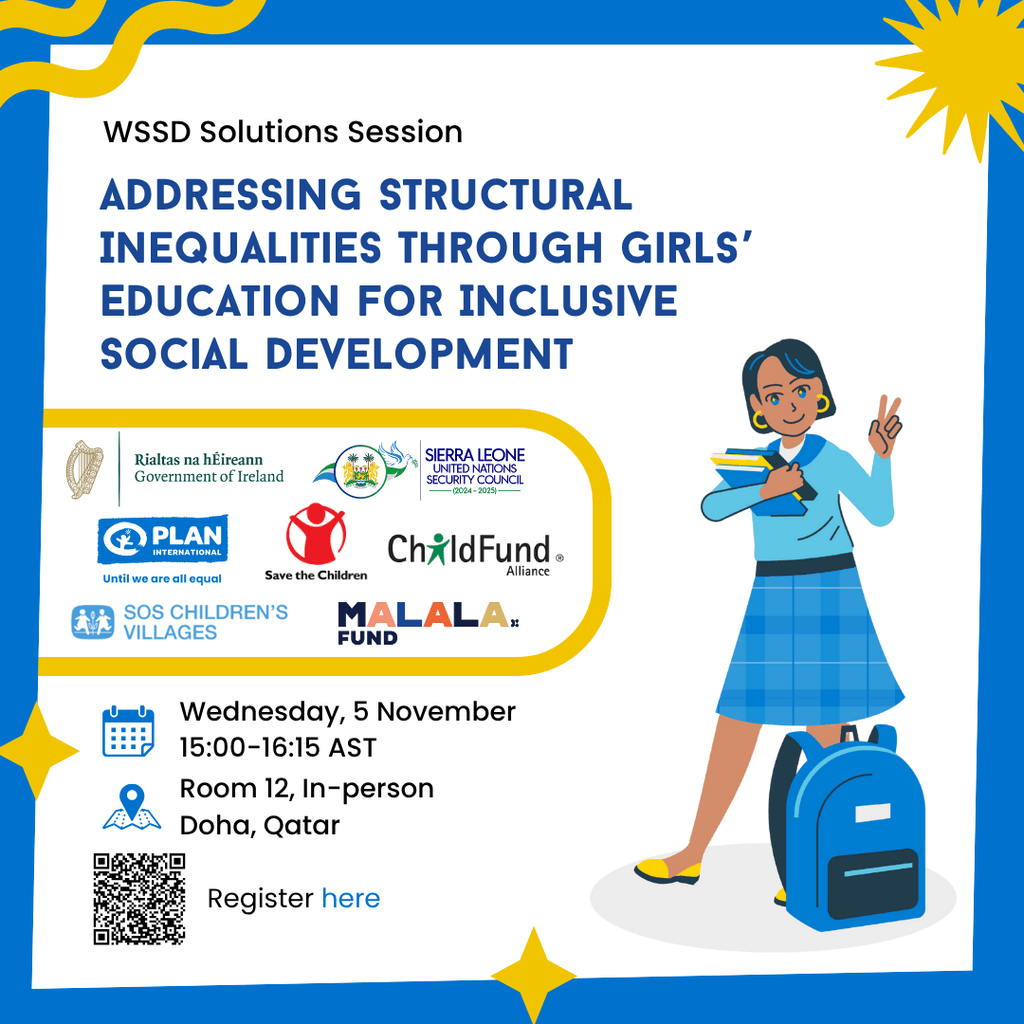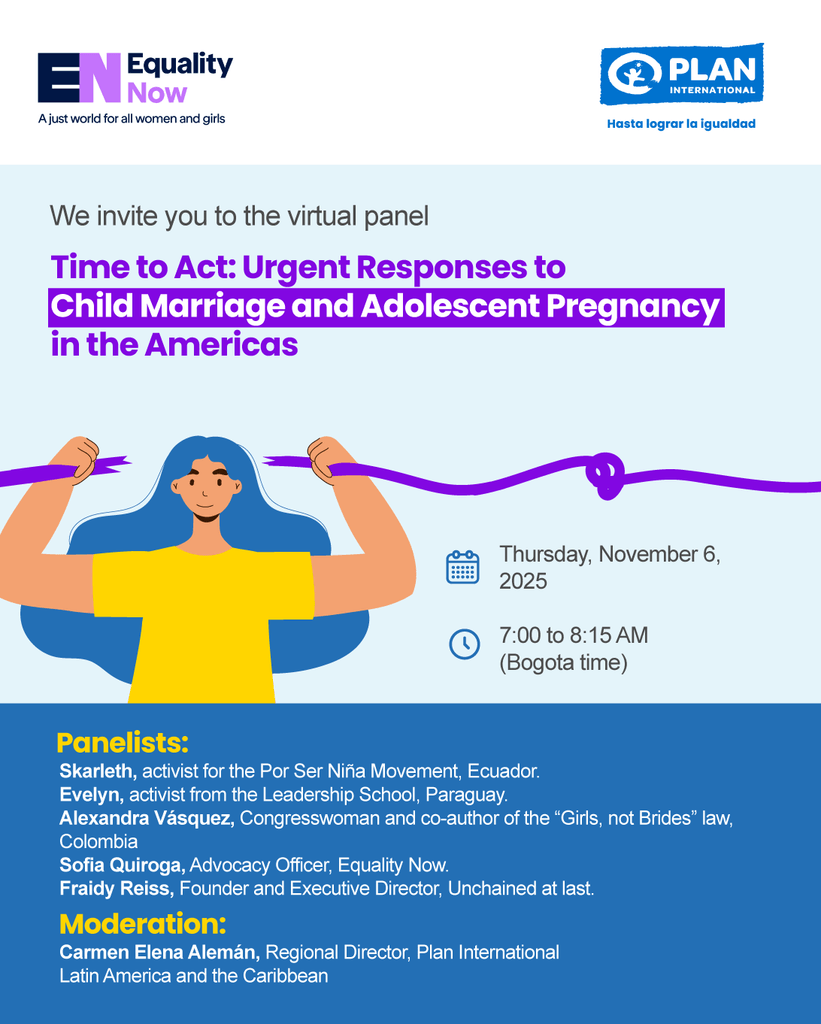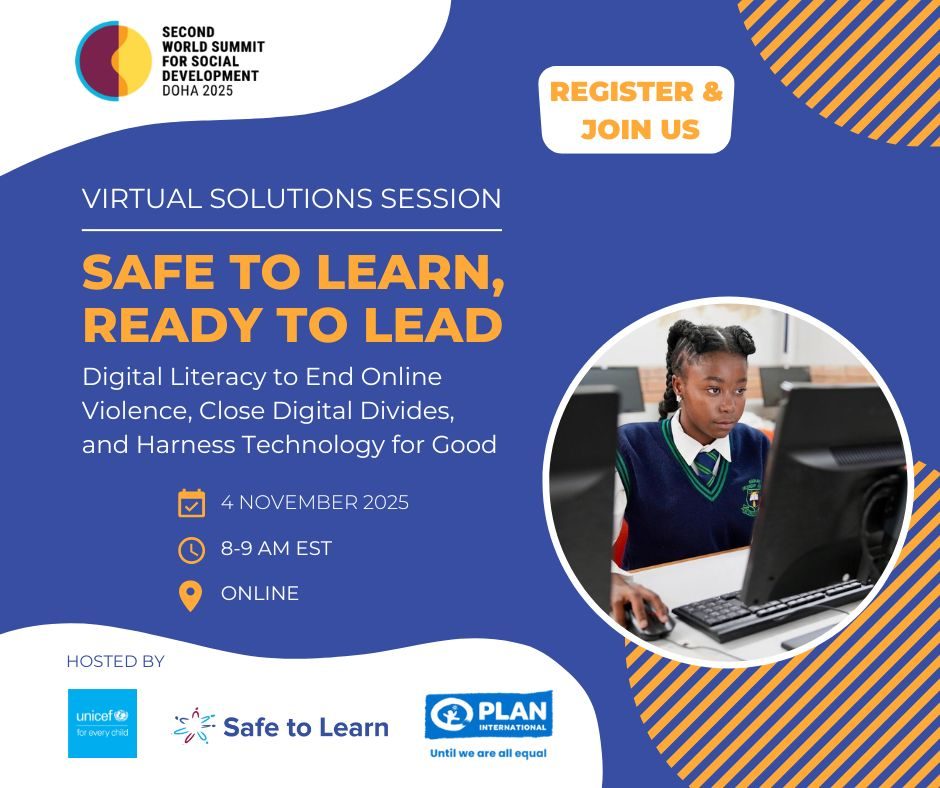Plan International Worldwide Annual Review 2024
This annual review is a summary of our global impact for children, particularly girls, in 2024.
Plan International and our partners are offering these solution sessions at the Second World Summit for Social Development in Doha.

When: Tuesday 4 November, 3:00pm-4:15pm
Where: Exhibition Hall 5, Committee Room 3, Qatar National Convention Centre, Doha, Qatar.
This side event will bring together government representatives, private sector representatives, philanthropic organisations, girls and youth activists and wider civil society to progress sustainable solutions to financing and delivering adolescent girls’ rights, in all their diversity.
This event will progress discussions and outcomes from the fourth UN Financing for Development Forum earlier this year and feature the launch of the Debt Justice for Girls Statement.
Why this matters:
Organizers: Plan International, Malala Fund, AGIP, GAGE, UNGEI
Co-sponsors: Government of Chile
Contact: Carron Mann- carron@malalafund.org for more information
Resourcing Adolescent girls: Concept Note
614.52 kb

When: Wednesday 5 November, 3:00pm-4:15pm
Where: Exhibition Hall 7, Room 12, Qatar National Convention Centre, Doha, Qatar.
This session, hosted by a coalition of leading child-focused organisations, will highlight how investing in girls’ education can dismantle structural inequalities and drive inclusive social development.
The event will feature a panel discussion with government representatives, civil society leaders, and youth advocates.
Why this matters:
Organisers: Plan International, ChildFund Alliance, Save the Children International, SOS Children’s Villages International, Malala Fund
Co-sponsors: Government of Ireland, Government of Sierra Leone
Contact: Maria Paula Suarez – mariapaula.suarez@plan-international.org for more information
Addressing Structural Inequalities: Concept Note
203.85 kb

When: Thursday 6 November, 3:00pm-4:15pm
Where: Online – register here to confirm your participation
Hosted by Plan International and Equality Now, this session will explore two urgent and persistent issues affecting girls in the Americas—adolescent pregnancy and Child, Early and Forced Marriage and Unions (CEFMU). These challenges are both a cause and consequence of poverty experienced by children in the region.
The event will focus on concrete prevention and response actions, ensuring that the voices, experiences, and demands of girls shape public policy agendas.
A participatory format will include audience interaction, with girls from Latin America and the Caribbean playing a central and leading role.
Why this matters:
Organisers: Plan International, Equality Now
Time's up: Concept Note
338.36 kb

When: Tuesday 4 November, 8:00am-9:15am EST
Where: Online – Register to confirm your participation
Contact: Emma Hamilton-Clark, ehamilton@unicef.org for more information
Access to quality education is vital for social integration and breaking the cycle of poverty. Yet, millions of children face violence in schools and online, with girls and marginalized groups most at risk. This event explores how digital technology and literacy can empower learners and close the digital divide while addressing the growing threats of cyberbullying and online violence. Through a gender-transformative lens, hear from ministries of education, experts and advocates on strategies to embed safe and inclusive digital literacy into education systems to ensure that every child can learn, lead, and thrive.
By joining this session, you will learn about:

When: Tuesday 4 November, 11:00am-12:30pm (Qatar time zone – UTC+3)
Where: Online. Please register here
Hosted by: International Civil Society Centre
Co-organisers: Islamic Relief Worldwide, Plan International
Contact: Francis Anyaegbu – Francis.Anyaegbu@plan-international.orgfor more information
This side event at the Second World Summit for Social Development will explore how Citizen Data can drive social and economic inclusion by enabling marginalised communities to document their own realities and influence policy change. Drawing from practical initiatives in Nepal, India, and Palestine, the session will highlight how participatory data approaches are helping to identify structural barriers, strengthen civic engagement, and promote inclusive governance.
Through case studies—from Nepal’s Voices Count initiative to new efforts with Denotified and Nomadic Tribes in India and inclusive data work in Palestine—the event will demonstrate how locally generated evidence can amplify excluded voices and inform systemic policy reforms.
The discussion will bring together civil society leaders, policymakers, and data practitioners to examine strategies for institutionalising Citizen Data within governance systems and to explore its potential to advance the World Social Summit’s goal of deepening social integration.
Why this matters:
• Marginalised communities often remain invisible in public decision-making due to limited or non-existent disaggregated data.
• Citizen Data helps close data gaps, enhances accountability, and ensures evidence reflects lived experiences.
• Inclusive, community-led data practices can reshape policy dialogues and support long-term, systemic change toward social integration.